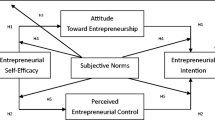Abstract
Specifying the mechanism through which perceived self-efficacy affects one’s behavior has been one of the main concerns of researchers and educators particularly in entrepreneurship domain due to the critical role that entrepreneurial self-efficacy plays in motivating and enabling individuals to establish a new venture. This study examines the relationship between entrepreneurial self-efficacy, self-regulation and entrepreneurial intention using Bandura’s structural path model for the constructs. The sample was composed of 722 public and private Malaysian university students. The results revealed that students’ entrepreneurial self-efficacy has the most significant and positive impact on their intention to become an entrepreneur. More specifically, entrepreneurial self-efficacy highly affects students’ entrepreneurial intention both directly and indirectly. Furthermore, self-regulation partially mediates the relationship between entrepreneurial self-efficacy and students’ entrepreneurial intention. Implications of these findings for entrepreneurship research and education are discussed.

Similar content being viewed by others
References
Ajzen, I. (1991). The theory of planned behavior. Organizational Behavior and Human Decision Processes, 50, 179–211.
Ajzen, I. (2002). Perceived behavioral control, self-efficacy, locus of control, and the theory of planned behavior. Journal of Applied Social Psychology, 32, 1–20.
Bandura, A. (1997). Self-efficacy: The exercise of contro. New York: W.H. Freeman and Company.
Bandura, A. (1999). A social cognitive theory of personality. In L. Pervin & O. John (Eds.), Handbook of personality (2nd ed., pp. 154–196). New York: Guilford.
Bandura, A. (2000). Exercise of human agency through collective efficacy. Current Directions in Psychological Science, 9, 75–78.
Bandura, A. (2012). On the functional properties of perceived self-efficacy revisited. Journal of Management, 38, 9–44.
Barbosa, S. D., Gerhardt, M. W., & Kickul, J. R. (2007). The role of cognitive style and risk preference on entrepreneurial self-efficacy and entrepreneurial intentions. Journal of Leadership and Organizational Studies, 13(4), 86–104.
BarNir, A., Watson, W. E., & Hutchins, H. M. (2011). Mediation and moderated mediation in the relationship among role models, self-efficacy, entrepreneurial career intention, and gender. Journal of Applied Social Psychology, 41(2), 270–297.
Baron, R. M., & Kenny, D. A. (1986). The moderator-mediator variable distinction in social psychological research: conceptual, strategic, and statistical considerations. Journal of Personality and Social Psychology, 51, 1173–1182.
Baum, J. R., & Locke, E. A. (2004). The relationship of entrepreneurial traits, skill, and motivation to subsequent venture growth. Journal of Applied Psychology, 89, 587–598.
Berger, J. L., & D’Ascoli, Y. (2012). Motivations to become vocational education and training educators: a person-oriented approach. Vocations and Learning, 5, 225–249.
Betz, N. E., & Hackett, G. (2006). Career self-efficacy theory: back to the future. Journal of Career Assessment, 14, 3–11.
Boyd, N. G., & Vozikis, G. S. (1994). The influence of self-efficacy on the development of entrepreneurial intentions and actions. Entrepreneurship Theory and Practice, l18, 63–90.
Brockner, J., Higgins, E. T., & Low, M. B. (2004). Regulatory focus theory and the entrepreneurial process. Journal of Business Venturing, 19(2), 203–220.
Bryant, P. (2006). Improving entrepreneurial education through self-regulatory skills. The NCIIA, 279–289.
Bryant, P. (2007). Self-regulation and decision heuristics in entrepreneurial opportunity evaluation and exploitation. Management Decision, 45(4), 732–748.
Bryant, P. (2009). Self-regulation and moral awareness among entrepreneurs. Journal of Business Venturing, 24, 505–518.
Busenitz, L. W., West, G. P., Shepherd, D., Nelson, T., Chandler, G. N., & Zacharakis, A. (2003). Entrepreneurship research in emergence: past trends and future directions. Journal of Management, 29(3), 285–308.
Carr, J. C., & Sequeira, J. M. (2007). Prior family business exposure as international influence and entrepreneurial intent: a theory of planned behavior approach. Journal of Business Research, 60, 1090–1098.
Carsrud, A., & Brännback, M. (2011). Entrepreneurial motivations: what do we still need to know? Journal of Small Business Management, 49(1), 9–26.
Chen, Y., & He, Y. (2011). The impact of strong ties on entrepreneurial intention: an empirical study based on the mediating role of self-efficacy. Journal of Chinese Entrepreneurship, 3(2), 147–158.
Chen, C., Greene, P., & Crick, A. (1998). Does entrepreneurial self-efficacy distinguish entrepreneurs from managers? Journal of Business Venturing, 13, 295–316.
Cheng, M. Y., Chan, W. S., & Mahmood, A. (2009). The effectiveness of entrepreneurship education in Malaysia. Education and Training, 51(7), 555–566.
Cox, L., Mueller, S. L., & Moss, S. E. (2002). The impact of entrepreneurial education on entrepreneurial self-efficacy. International Journal of Entrepreneurship Education, 1(2), 229–247.
Culbertson, S. S., Smith, M. R., & Leiva, P. I. (2011). Enhancing entrepreneurship: the role of goal orientation and self-efficacy. Journal of Career Assessment, 19, 115–129.
De Clercq, D., Benson, H., & Martin, B. (2012). The roles of learning orientation and passion for work in the formation of entrepreneurial intention. International Small Business Journal, 0(0), 1–25.
DeNoble, A. F., Jung, D., & Ehrlich, S. B. (1999). Entrepreneurial self-efficacy: The development of a measure and its relationship to entrepreneurial action (pp. 73–87). Waltham: P&R Publications Inc.
DePillis, E., & Reardon, K. K. (2007). The influence of personality traits and persuasive messages on entrepreneurial intention: a cross-cultural comparison. Career Development International, 12(4), 382–396.
Dwyer, A. L., & Cummings, L. C. (2001). Stress, self-efficacy, social support and coping strategies in university students. Journal of counselling, 35, 3.
Erikson, T. (2003). Towards a taxonomy of entrepreneurial learning experiences among potential entrepreneurs. Journal of Small Business and Enterprise Development, 10(1), 106–112.
Fayolle, A., & Gailly, B. (2008). From craft to science: teaching models and learning processes in entrepreneurship education. Journal of European Industrial Training, 32(7), 569–593.
Fayolle, A., Gailly, B., & Lassas-Clerc, N. (2006). Assessing the impact of entrepreneurship education programmes: a new methodology. Journal of European Industrial Training, 30(9), 701–720.
Fitzsimmons, J. R., & Douglas, E. J. (2011). Interaction between feasibility and desirability in the formation of entrepreneurial intentions. Journal of Business Venturing, 26(4), 431–440.
Fuchs, K., Werner, A., & Wallau, F. (2008). Entrepreneurship education in Germany and Sweden: what role do different school systems play? Journal of Small Business and Enterprise Development, 15(2), 365–381.
Gegenfurtner, A. (2012). Dimensions of motivation to transfer: a longitudinal analysis of their influence on retention, transfer, and attitude change. Vocations and Learning. doi:10.1007/s12186-012-9084-y.
Grant, H., & Higgins, E. T. (2003). Optimism, promotion pride, and prevention pride as predictors of quality of life. Personality & Social Psychology Bulletin, 29(12), 1521–1532.
Guerrero, M., Rialp, J., & Urbano, D. (2008). The impact of desirability and feasibility on entrepreneurial intentions: a structural equation model. International Entrepreneurship and Management Journal, 4, 35–50.
Hair, J. F., Black, W. C., Babin, B. J., & Anderson, R. E. (2010). Multivariate data analysis (7th ed.). USA: Pearson Prentice Hall.
Heinonen, J. (2007). An entrepreneurial-directed approach to teaching corporate entrepreneurship at University level. Education and Training, 49(4), 310–324.
Higgins, E. T. (1998). Promotion and prevention: regulatory focus as a motivational principle. Advances in Experimental Social Psychology, 30, 1–46.
Higgins, E. T., Friedman, R. S., Harlow, R. E., Idson, L. C., Ayduk, O. N., & Taylor, A. (2001). Achievement orientations from subjective histories of success: promotion pride versus prevention pride. European Journal of Social Psychology, 31(1), 3–23.
Hmieleski, K. M., & Baron, R. A. (2008). Regulatory focus and new venture performance: a study of entrepreneurial opportunity exploitation under conditions of risk versus uncertainty. Strategic Entrepreneurship Journal, 2, 285–299.
Ho, R. (2006). Handbook of univariate and multivariate data analysis and interpretation with SPSS. Florida: Chapman and Hall.
Kickul, J., Wilson, F., & Marlino, D. (2008). Are misalignments of perceptions and self-efficacy causing gender gaps in entrepreneurial intentions among our nation’s teens? Journal of Small Business and Enterprise Development, 15(2), 321–335.
Kickul, J., Gundry, L. K., Barbosa, S. D., & Whitcanack, L. (2009). Intuition versus analysis? Testing differential models of cognitive style on entrepreneurial self-efficacy and the new venture creation process. Journal of Entrepreneurship Theory and Practice, 33(2), 439–453.
Krueger, N. F., Reilly, M. D., & Carsrud, A. L. (2000). Competing models of entrepreneurial intentions. Journal of Business Venturing, 15(5/6), 411–432.
Kyndt, E., Govaerts, N., Dochy, F., & Baert, H. (2011). The learning intention of low-qualified employees: a key for participation in lifelong learning and continuous training. Vocations and Learning, 4, 211–229.
Liñán, F. (2008). Skill and value perceptions: how do they affect entrepreneurial intention? International Entrepreneurship and Management Journal, 4, 257–272.
Markman, G. D., & Baron, R. A. (2003). Person–entrepreneurship fit: why some people are more successful as entrepreneurs than others. Human Resource Management Review, 13, 281–301.
Mastura, J., & Abdul Rashid, A. Z. (2008). Entrepreneurship education in developing country, exploration on its necessity in the construction program. Journal of Engineering, Design and Technology, 6(2), 178–189.
Matlay, H. (2005). Researching entrepreneurship and education Part 1: what is entrepreneurship and does it matter? Education and Training, 47(8/9), 665–677.
Matlay, H. (2006). Researching entrepreneurship and education Part 2: what is entrepreneurship education and does it matter? Education and Training, 48(8/9), 704–718.
McGee, J. E., Peterson, M., Mueller, S. L., & Sequeira, J. M. (2009). Entrepreneurial self-efficacy: refining the measure. Entrepreneurship Theory & Practice, 33, 965–988.
McMullen, J. S., & Shepherd, D. A. (2002). Regulatory focus and entrepreneurial intention: action bias in the recognition and evaluation of opportunities. In W. D. Bygrave et al. (Eds.), Frontiers of entrepreneurship research. Babson Park: Babson College.
McMullen, J. S., Bagby, D. R., & Palich, L. E. (2008). Economic freedom and the motivation to engage in entrepreneurial action. Entrepreneurship Theory and Practice, 32(5), 875–895.
Mueller, S. L., & Thomas, A. S. (2000). Culture and entrepreneurial potential: a nine country study of locus of control and innovativeness. Journal of Business Venturing, 16, 51–75.
Murali, S., Mohani, A., & Yuzliani, Y. (2009). Impact of personal qualities and management skills of entrepreneurs on venture performance in Malaysia: opportunity recognition skills as a mediating factor. Technovation, 29, 798–805.
Pittaway, L., & Cope, J. (2007). Entrepreneurship education: a systematic review of the evidence. International Small Business Journal, 25(5), 479–510.
Podsakoff, P. M., MacKenzie, S. B., Lee, J.-Y., & Podsakoff, N. P. (2003). Common method biases in behavioral research: a critical review of the literature and recommended remedies. Journal of Applied Psychology, 88, 879–903.
Podsakoff, P. M., MacKenzie, S. B., & Podsakoff, N. P. (2012). Sources of method bias in social science research and recommendations on how to control it. Annual Review of Psycology, 65, 539–569.
Rae, D., & Carswell, M. (2000). Using a life-story approach in entrepreneurial learning: the development of a conceptual model and its implications in the design of learning experiences. Education and Training, 42(4/5), 220–227.
Scherer, R. F., Adams, J. S., Carley, S. S., & Wiebe, F. A. (1989). Role model performance effects on development of entrepreneurial career preference. Entrepreneurship Theory and Practice, 13(3), 53–71.
Schjoedt, L., & Shaver, K. G. (2007). Deciding on an entrepreneurial career: a test of the pull and push hypotheses using the panel study of entrepreneurial dynamics data. Entrepreneurship Theory and Practice, 31(5), 733–752.
Segal, G., Borgia, D., & Schoenfeld, J. (2005). The motivation to become an entrepreneur. International Journal of Entrepreneurial Behavior and Research, 11(1), 42–57.
Souitaris, V., Zerbinati, S., & Al-Laham, A. (2007). Do entrepreneurship programmes raise entrepreneurial intention of science and engineering students? The effect of learning, inspiration and resources. Journal of Business Venturing, 22, 566–591.
Trevelyan, R. (2011). Self-regulation and effort in entrepreneurial tasks. International Journal of Entrepreneurial Behavior & Research, 17(1), 39–63.
Tumasjan, A., & Braun, R. (2012). In the eye of the beholder: how regulatory focus and self-efficacy interact in influencing opportunity recognition. Journal of Business Venturing, 27(6), 622–636.
Tyszka, T., Cieslik, J., Domurat, A., & Macko, A. (2011). Motivation, self-efficacy, and risk attitudes among entrepreneurs during transition to a market economy. The Journal of Socio-Economics, 40, 124–131.
Wilson, F., Kickul, J., & Marlino, D. (2007). Gender, entrepreneurial self-efficacy, and entrepreneurial career intentions: implications for entrepreneurship education. Entrepreneurship Theory and Practice, 31(3), 387–401.
Zhao, H., Seibert, S. E., & Hills, G. E. (2005). The mediating role of self-efficacy in the development of entrepreneurial intentions. Journal of Applied Psychology, 90(6), 1265–1272.
Author information
Authors and Affiliations
Corresponding author
Rights and permissions
About this article
Cite this article
Pihie, Z.A.L., Bagheri, A. Self-Efficacy and Entrepreneurial Intention: The Mediation Effect of Self-Regulation. Vocations and Learning 6, 385–401 (2013). https://doi.org/10.1007/s12186-013-9101-9
Received:
Accepted:
Published:
Issue Date:
DOI: https://doi.org/10.1007/s12186-013-9101-9




